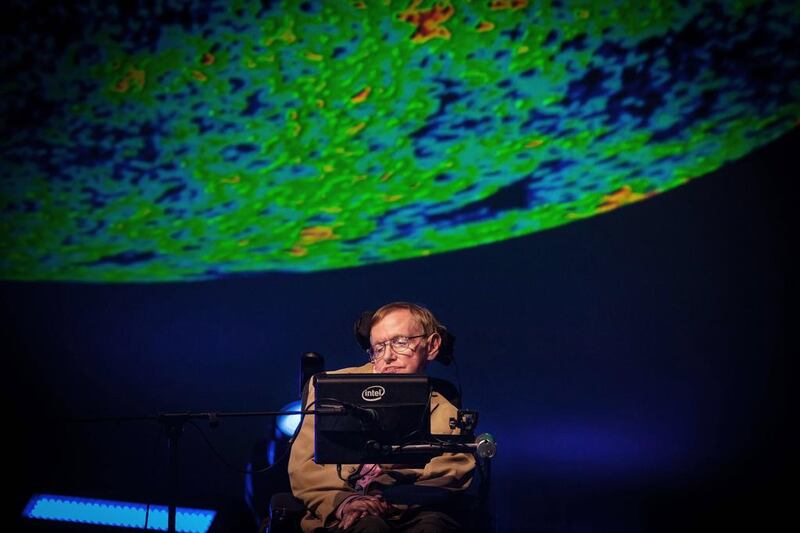Few of us might understand the day jobs of brilliant scientists such as Stephen Hawking but one thing’s for sure – they are all doing science. Or are they?
Could it be that their mind-bending theories are untestable pipe dreams guaranteed to keep scientists in work and the rest of us in the dark?
Three academics in the US have sparked a huge public row by raising this outrageous possibility. And their temerity has led to a public drubbing by more than 30 leading scientists, including four Nobel Prize-winners and Prof Hawking.
As the vociferous response shows, this is no mere philosophical wrangle. By casting doubt on where fundamental research is going, the row threatens reputations – and the funding of atom-smashers, space probes and lab experiments often touted as being on the brink of cosmic breakthroughs.
The idea that such research has stalled may seem odd, given the advances made recently, such as the discoveries of the Higgs particle – explaining the origin of mass – and gravitational waves from black hole collisions.
Yet the awkward fact is that these were confirmations of predictions made more than 50 years ago using well-attested theories of how the universe works.
Since the 1980s, theorists have failed to devise anything as impressive. Instead, there has been an explosion of speculative ideas claiming to explain everything from the origin of the universe to the forces of nature.
This lack of solid progress has been a source of unease in academia. But this year, a trio of theorists – two from Princeton University and one at Harvard – went public with their concern that, whatever else these speculative theories are, they aren’t science.
In an article in Scientific American, they focused on one of the key cosmic theories.
Since it first emerged about 40 years ago, so-called “inflation theory” has become the cornerstone of explanations of exactly what happened during the Big Bang 14 billion years ago.
Put simply, the theory states that the universe was originally filled with an anti-gravitational force known as a scalar field. In an instant, this inflated the initially tiny universe to the size of a football and then vanished, dumping its energy into the universe. That energy was converted into mass courtesy of Einstein’s famous equation E = mc² leading to an expanding universe with stars, planets – and us.
All very mind-boggling, but one doesn’t need a physics PhD to have a few questions about it all. Where did this scalar field come from and why did it vanish?
To this day, the answers are unclear. But that’s not even the problem highlighted by the trio.
The concern of the three theorists is more basic. They claim that inflation theory is so vague that it’s impossible to prove wrong – it can always be tweaked to agree with whatever astronomers discover. And that means it’s not proper science.
The suggestion that scientists have spent their lives playing mind games is, of course, fighting talk. It hardly helps that one of the trio, Paul Steinhardt of Princeton University, is one of the creators of inflation theory.
Sure enough, a letter responding to the charge has appeared in Scientific American signed by more than 30 of the world's leading experts on inflation.
Outraged, they accuse the trio of “dismissing the research of all of the authors of this letter but also that of a large contingent of the scientific community”.
They insist that not only has inflation theory made predictions but that these have been confirmed in great detail by astronomical observations.
But according to Prof Steinhardt and his colleagues, that proves nothing – as inflation theory is so flexible it can always be made consistent with the observational data. And to underline this point, they highlight a version of the theory that even its creators concede really does allow anything to happen.
Known as eternal inflation, it implies that our universe is just one expanding “bubble” among an infinitude – each with its own laws of physics.
Prof Steinhardt and his colleagues even quote Prof Alan Guth, of the Massachusetts Institute of Technology – one of the co-inventors of inflation theory and a signatory to the Scientific American response – admitting that in the multiverse "The question of what is possible becomes trivial – anything is possible".
So if inflation theory is a bust, what do Prof Steinhardt and colleagues see as the way forward?
Far from seeking the demise of inflation theory, the trio want it to offer less wriggle room. But they also call on theorists to consider the possibility that inflation may be wrong – and work up other explanations about the birth of the universe. Prof Steinhardt has worked on one such idea – that the Big Bang was just one of an endless series.
Such ideas have received little attention, not least because research funds tends to focus on “mainstream” theories – such as inflation.
There is, however, another possibility – perhaps fundamental science has reached its limits.
About a century ago, mathematicians were convinced they could understand the foundations of their subject. But in the 1930s, they found there were questions that could be asked, but never definitively answered.
While it shocked mathematicians, it didn’t make them redundant – there were plenty of questions left to tackle.
Theorists may now have reached a similar impasse. If they have, then the continuing row about the future of cosmic science starts to look like two bald men arguing over a comb.
newsdesk@thenational.ae
Robert Matthews is visiting professor of science at Aston University, Birmingham, UK






